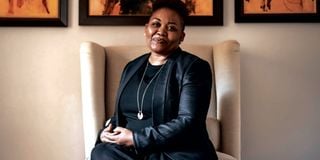South Africa’s women-led start-ups battle funding gap

Tlalane Ntuli, a South African entrepreneur, is among the women who need venture capital that is focused on them.
What you need to know:
- Yalu won one million Rand (Ksh7.6m) grant from the private and public sectors, but when the funding ran out, the prestige wasn’t enough to keep it fighting; the company ceased operations.
- This is the reality of many start-ups, especially those led by black women.
In 2018, Tlalane Ntuli started Yalu, a Johannesburg-based credit life insurer, out of frustration.
There was no space to make a difference in the corporate world, which she had been part of for a decade, working as head of marketing and growth for an insurance company in South Africa. The financial sector, which has been slow to transform, was also begging to be disrupted.
“I remembered what it was like to have a frustrated mother and thinking that’s what my children are going to see. That’s their childhood,” she says. “It was also about creating a legacy for them. “If you are miserable, create a space for yourself that isn't miserable.”
Launched in 2018, Yalu founders were lauded by industry commentators for rattling the cage of the insurance industry. Credit life insurance pays for customers’ debts should they be unable to pay it due to retrenchment, disability or death.
Ms Ntuli and her Yalu co-founder Mr Nkazi Sokhulu, won one million Rand (Ksh7.6m) grant from the private and public sectors, but when the funding ran out, the prestige wasn’t enough to keep Yalu fighting. The company ceased operations.
Pitching Yalu
This is the reality of many start-ups, especially those led by black women. Ms Ntuli says she realised, when pitching Yalu to investors, only a handful of the entrepreneurs around her were women. Even less were, like herself and her co-founder, black.
“In my experience, a lot of the start-ups that get funding are white-led. Whether they get funded by international funds or local ones,” she says.
In November 2018, venture capital expert Lwazi Wali started HerHQ — which aims to be Africa’s first social, capital market for pan-African women entrepreneurs of colour — because of her own experience figuring out how to build a business and raising the money to do it.
“I discovered three bottlenecks to why women don't start businesses —access to knowledge, capital and markets. I think we are going to see a lot of shifts happening once women on the continent have access to these three things,” she says.
There is no shortage of good ideas out there, but a good idea needs money to make it come to life. Women, however, face greater barriers than their male counterparts to access funding for their start-ups.
Investments database Crunchbase found that although global venture funding was up four per cent in 2020, only 2.3 per cent of this went to women-led start-ups, which had doubled between 2014 and 2019. According to the data, more than 800 women-founded start-ups globally received a total of $4.9 billion in venture funding in 2020 —a 27 per cent decrease compared to 2019.
But, Ms Wali says, there is still a long road ahead towards the transformation of venture capital in South Africa.
Venture capital
“There has been some notable traction. But in terms of systemic change, capital as an institution is not designed for the average African or woman.”
This seems to be the case in other countries as well. In the US, the share of the overall venture capital that went to black-founded companies stood at three per cent in 2020, Crunchbase data shows.
A 2020 report by Extend Ventures, an organisation aimed at democratising access to venture capital, found that black founders received just 0.24 per cent of funding in the UK. Women founders received only 11 per cent of UK venture funding in the last ten years, the report found.
Dominique Collett, a senior investment executive and head of the South African fintech incubator AlphaCode, says it is important to get more start-ups founded by women and black entrepreneurs off the ground because they provide solutions that are personal to them.
Meanwhile, Ms Ntuli says she will likely never try launching a start up again.
“But we did get a chance. And in fact, in some crazy way, we did disrupt an industry,” she says, explaining that now more people know to ask about credit life insurance before signing off on a credit facility.
This article is published within the framework of "Towards Equality", a collaborative journalism operation gathering 15 news media from all over the world highlighting the challenges and solutions to achieve gender equality.





